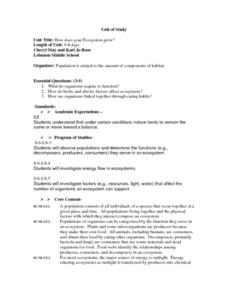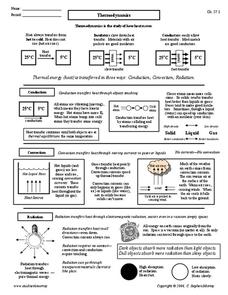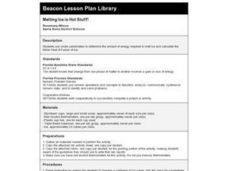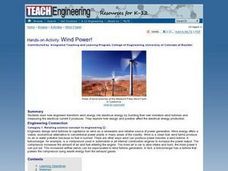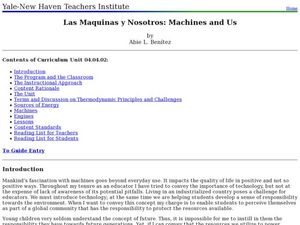Curated OER
Avoiding Carbon Dioxide Emissions from Burning Fossil Fuels
Students calculate stoichiometrically the amount of carbon dioxide that would be emitted from burning a mole of varios alkanes that comprise fossile fuels. If the energy released from burning a mole of these alkanes is known, then the...
Curated OER
You Are What You Eat (Grades 5-8)
Students gain an enhanced understanding of the relationship between proper nutrition and good health. Through use of video, hands-on activities and interaction, students measure energy in food, and recognize sources of vitamins and...
Curated OER
PHYSICS LESSONS
Students study the concept of electricity, what an electric current is and its relationship between voltage and resistance.For this electrical lesson students solve problems using Ohm's law, and research alternative sources of electricity.
Curated OER
Stop Heat from Escaping
Students explore the uses of insulation and describe how insulation helps to conserve energy. They work in groups and use plastic, wool, paper and aluminum to experiment with the heat-retaining properties of various materials.
Curated OER
How Does Your Ecosystem Grow?
Students consider that under certain conditions in nature tend to remain the same or move toward a balance. They observe populations and determine the functions (e.g., de-composers, producers, consumers) they serve in an ecosystem. They...
Curated OER
Food Chain: what's for dinner?
Fourth graders identify where foods came from and sequence a food chain. In this food chain instructional activity, 4th graders define vocabulary related to food chains and order a food chain. Students follow the energy of a food...
Curated OER
Ecology 5 - Carbon and Oxygen Cycles
Students construct their own diagrams outlining the pathway of carbon and oxygen in our atmosphere. They listen to a lecture on the carbon cycle while drawing an example of the carbon cycle on the board. Students comprehend that CO2 is...
Curated OER
Thermodynamics
In this thermodynamics worksheet, students learn about insulators and conductors. Students compare the three ways thermal energy is transferred: conduction, convection, and radiation. This worksheet has 22 matching, 1 multiple choice, 3...
Curated OER
Photosynthesis
High schoolers conduct a variety of experiments on photosynthesis. In this biology instructional activity, students identify the factors required for the process to occur. They perform computerized experiments to test the amount of...
Curated OER
Melting Ice is Hot Stuff!
Fourth graders determine the amount of energy required to melt ice using a calorimeter. They calculate the Molar Heat of Fusion of Ice.
Curated OER
Thar She Blows!: Wind Power
Students examine how wind energy is transformed into electrical energy. In pairs, they build miniature wind turbines and measure how much electrical current they produce. They asses the importance of design and position in energy...
Curated OER
WiTricity Explained
Students explain how electricity is transferred from source to load without actual wires connecting the two. In this physics lesson, students explore how wireless electricity was discovered. They cite practical applications of this...
Curated OER
The Webb Space Telescope: Detecting Dwarf Planets
In this detecting dwarf planets worksheet, high schoolers read about the Webb Space Telescope that will be launched in 2014 to detect dwarf planets using an infrared telescope. Students solve 3 problems and create a graph for each using...
Curated OER
Chlorophyll
Students explain the importance of chlorophyll in plants. In this biology lesson, students extract chlorophyll from different plant sources using chromatography. They discover the different factors needed for photosynthesis to take place.
Curated OER
Las Maquinas y Nosotros: Machines and Us
Second graders explain the relationship between energy and work. In this technology lesson, 2nd graders describe the different uses of machines in their everyday lives. They record observations and data in their science journal.
Curated OER
Basic Vitamins: Water-Soluble and Fat-Soluble
High schoolers examine vitamins and study their functions and food sources. They research what happens to vitamins when foods are overcooked. They prepare a microwaveable vegetable quiche.
Other popular searches
- Alternative Energy
- Alternative Energy Sources
- Alternative Fuels
- Alternative Energy Worksheet
- Renewable Energy Resources
- Alternative Energy Forms
- Alternate Energy Sources
- Renewable Energy Sources
- Sources of Energy
- Types of Energy Sources
- Alternative Energy Resources
- Exploring Alternative Energy






